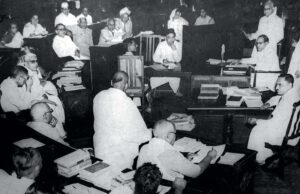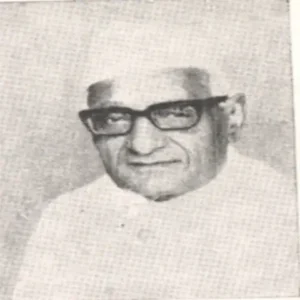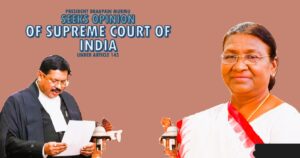Background:
The Legislature for the State of Tamil Nadu, between 13.01.2020 and 28.04.2023, enacted and forwarded 12 Bills to the Governor for the grant of assent as per Article 200 of the Constitution. Even though the present Governor took charge of the office with effect from 18.11.2021, he did not take the necessary action on any of the said Bills forwarded to his office till October 2023. The State of Tamil Nadu, being aggrieved by the inaction on the part of the Governor, had to ultimately file the present writ petition before Court. The same was filed on 31.10.2023.
The State Legislature, on 18.11.2023, convened a special session and repassed the 10 bills which were returned by the Governor after withholding of assent. The bills were passed without any material change and were forwarded to the Governor’s Secretariat on the same day for his assent in accordance with the first proviso to Article 200. This Court, in its order dated 20.11.2023, noted that since the re-passed 10 bills were pending with the Governor, the hearing of the writ petition be adjourned to 01.12.2023 and issued directions that this Court shall be apprised of the progress in the matter.
On 28.11.2023, the Governor, without the aid and advice of the Council of Ministers of the State, in exercise of his discretion, reserved the said re-passed Bills for the consideration of the President. The letter of the Governor to the Union Government referring the said Bills for the consideration of the President mentioned that the Bills were re-considered and passed again by the State Legislature. Interestingly, although the Governor noted that the Bills were intra-vires the competence of the State Legislature having been legislated under Entry 66 of List I, Entry 32 of List II and Entry 25 of List III, yet he reserved the said Bills for the consideration of the President in the second round on the ground that the Bills suffered from repugnancy on account of being contrary to Entry 66 of the Union List i.e., List I. These grounds have been taken by the Governor to reserve the 10 Bills for consideration of the President.
In the premises Chief Minister asked the Governor to (i) Recall the 10 Bills reserved for the consideration of the President and grant assent expeditiously;(ii) In future, grant assent to Bills passed by the State Legislature within 30 days and avoid unnecessary reservation of the bills for the consideration of the President; (iii) Act in accordance with the aid and advice tendered by the Council of Ministers.
Matter went up to the Supreme Court
COMMENTS OF AUTHOR
Before going into the details of the Judgement, it is not highlighted that even the state government of Tamil Nadu was playing mischief with provisions of the Constitution. Question arises, how?
Article 200 of the Constitution provides that if the Bill is returned by the Governor, the State Assembly may re-pass the Bill with or without modification and the Governor cannot withhold the same. (The said Article text is given herein below)
Here also, the State Assembly re-passed the Bills without any amendments and without implementing the suggestions of the Governor. Pursuant thereto, all the bills were sent to the President of India for consideration.
Now let’s discuss the Judgment
Supreme Court division bench in its judgment in the matter of WRIT PETITION (CIVIL) NO. 1239 OF 2023 THE STATE OF TAMIL NADU VERSUS THE GOVERNOR OF TAMILNADU & ANR.
The Supreme Court gave the following findings on judicial review of the exercise of power by the Governor under Article 200 and the power by the President under Article 201 in which 6 months’ time limit is prescribed. In the said Judgment power is given to the State Council of Ministers to assail if bill is reserved for President’s opinion, if the reference made by the Governor fails to indicate the reasons for such reservation as discussed above or that the reasons indicated are wholly irrelevant, mala-fide, arbitrary, unnecessary or motivated by extraneous considerations. It is observed by the division bench that a question completely capable of being determined by the constitutional courts would be fully justiciable. Reservation of a bill on grounds other than the ones mentioned above, such as personal dissatisfaction of the Governor, political expediency or any other extraneous or irrelevant considerations, is strictly impermissible by the Constitution and would be liable to be set aside forthwith on that ground alone. This will encompass the reservation of a bill by the Governor after having already exercised the option of withholding of assent in terms of Article 200, except in such exceptional circumstances as mentioned in paragraph 204 of this judgment. It was held that the reservation by the Governor of in the present case, the ten Bills for the consideration of the President in the second round, was illegal, erroneous in law and is thus liable to be set aside. As a result, any subsequent action taken upon the said Bills by the President also does not survive and is thus set aside.
Judgment is running into 400 odd pages, and here is the scanning key to read and download the same
Now this Judgment has created a storm. It raises many constitutional issues.
1. Article 111. Assent to Bills : When a Bill has been passed by the Houses of Parliament, it shall be presented to the President and the President shall declare either that he assents to the Bill, or that he withholds assent therefrom:
Provided that the President may, as soon as possible after the presentation to him of a Bill for assent, return the Bill if it is not a Money Bill to the Houses with a message requesting that they will reconsider the Bill or any specified provisions thereof and, in particular, will consider the desirability of introducing any such amendments as he may recommend in his message, and when a Bill is so returned, the Houses shall reconsider the Bill accordingly, and if the Bill is passed again by the Houses with or without amendment and presented to the President for assent, the President shall not withhold assent therefrom.
My Notes: However, there is no specific time limit provided. Similar is the case for the Governor, which is Article 200.
- Assent to Bills.—When a Bill has been passed by the Legislative Assembly of a State or, in the case of a State having a Legislative Council, has been passed by both Houses of the Legislature of the State, it shall be presented to the Governor and the Governor shall declare either that he assents to the Bill or that he withholds assent therefrom or that he reserves the Bill for the consideration of the President: Provided that the Governor may, as soon as possible after the presentation to him of the Bill for assent, return the Bill if it is not a Money Bill together with a message requesting that the House or Houses will reconsider the Bill or any specified provisions thereof and, in particular, will consider the desirability of introducing any such amendments as he may recommend in his message and, when a Bill is so returned, the House or Houses shall reconsider the Bill accordingly, and if the Bill is passed again by the House or Houses with or without amendment and presented to the Governor for assent, the Governor shall not withhold assent therefrom:
Provided further that the Governor shall not assent to, but shall reserve for the consideration of the President, any Bill which in the opinion of the Governor would, if it became law, so derogate from the powers of the High Court as to endanger the position which that Court is by this Constitution designed to fill
- Bills reserved for consideration.—When a Bill is reserved by a Governor for the consideration of the President, the President shall declare either that he assents to the Bill or that he withholds assent therefrom:
Provided that, where the Bill is not a Money Bill, the President may direct the Governor to return the Bill to the House or, as the case may be, the Houses of the Legislature of the State together with such a message as is mentioned in the first proviso to article 200 and, when a Bill is so returned, the House or Houses shall reconsider it accordingly within a period of six months from the date of receipt of such message and, if it is again passed by the House or Houses with or without amendment, it shall be presented again to the President for his consideration.
CONSTITUENT ASSEMBLY: passed the following provision for return of the bills by the Governors and the President of India

The question is:
“That in amendment No. 1685 of the List of Amendments, in the proviso to article 91, for the proposed word ‘possible’, the words ‘may be’ be substitution.”
The amendment was negatived.
Mr. President: Now I put Amendment No. 1685.
The question is:
“That in the proviso to article 91, for the words ‘not later then six weeks’ the words ‘as soon as possible’ be substituted.”
The amendment was adopted.
Mr. President: Then I put the article as amended by these two amendments namely, Nos. 1685 and 1688.
The question is:
“That article 91, as amended, stand part of the Constitution.”
The motion was adopted.
Article 91, as amended, was added, to the Constitution.
Mr. President: We shall adjourn now, and meet on Monday at 5 P.M. The Assembly then adjourned till Five P.M. on Monday, the 23rd May, 1949.
Here is link of entire discussion:
https://indiankanoon.org/doc/1205272/
Instead of discussing these provisions Supreme Court took cognisance inter-alia of Pakistan Constitution which is an Islamic Republic Country. Their parameters mainly depend on Islamic laws. Which is not the case of India.
Court also considered several Judgments of USA courts however its provisions were discussed by the Constituent Assembly and rejected it.
British Model of passing the bill was also rejected.
Here are excerpts of Chiman Bhai Chakubhai Shah:

“One is the British model under which after a certain lapse of time the Bill passed by the Lower House automatically becomes an Act if certified by the Speaker. Then there is the Irish model under which the Lower House should again pass a Resolution accepting the Bill once more on which it will become an Act. But the analogy between these two models and our model has no application at all because both those are unitary constitutions where ours is a federal constitution. In a Federal Constitution, the Upper House is composed of the representatives of the various units or states. It is not like the House of Lords which is hereditary or which by its very character is conservative. Our Upper House is elected by the representatives of the various States and therefore it is as representative as the Lower House itself in a particular manner. The object of providing an Upper House in the Centre is to see that the States voice or the voice of the units is adequately represented. Therefore the third way of providing to resolve the deadlock is by Joint session.”
It was dr.B.R.Ambedkar who proposed six months time period which was put to vote and defeated. Supreme Court failed to consider this but referred to in its Judgment
My View and opinion :

The landmark judgment in the case of Kesavananda Bharati v. State of Kerala (1973) established the “basic structure doctrine” of the Indian Constitution. This doctrine limits Parliament’s power to amend the Constitution, ensuring that certain fundamental principles remain inviolable. The Supreme Court upheld the 24th Amendment Act but declared parts of the 25th Amendment to be ultra vires.
There is also doctrine of pith and substance laid down by same court. The Doctrine of Basic Structure posits that the fundamental structure of the Indian Constitution cannot be altered, even through a constitutional amendment. Consequently, the Parliament cannot pass a law that would change the basic structure of the Constitution. This doctrine isn’t explicitly mentioned in the Constitution but has evolved over time through various Supreme Court judgement.
Here the Bench which passed the Judgment was not constitutional Bench. Judicial overreach is prima-facie which could have been avoided by referring the matter to the Parliament for consideration, because it hits both the principles laid down by the same court’s larger benches.
Moreover it is State Governor who controls administration and appointment of the High Court, and the President of India is head of the Supreme Court. Hence to direct the head of institution by the Bench order of court also seen as judicial overreach.
What can be done is to insert provision to Art: 200 that the State Government must laid down reasons in writing for passing the Bills without amendments as suggested by the Governor and in case of Lok Sabha by the President of India.

After this President of India referred 14 Questions to the Supreme Court for its opinion under Article 143 of the Constitution of India on 15th May 2025 they are:
- What are the constitutional options before a Governor when a Bill is presented to him under Article 200 of the Constitution of India?
- Is the Governor bound by the aid and advice tendered by the Council of Ministers while exercising all the options available with him when a Bill is presented before him under Article 200 of the Constitution of India?
- Is the exercise of constitutional discretion by the Governor under Article 200 of the Constitution of India justiciable?
- Is Article 361 of the Constitution of India an absolute bar to the judicial review in relation to the actions of a Governor under Article 200 of the Constitution of India?
- In the absence of a constitutionally prescribed time limit, and the manner of exercise of powers by the Governor, can timelines be imposed and the manner of exercise be prescribed through judicial orders for the exercise of all powers under Article 200 of the Constitution of India by the Governor?
- Is the exercise of constitutional discretion by the President under Article 201 of the Constitution of India justiciable?
- In the absence of a constitutionally prescribed timeline and the manner of exercise of powers by the President, can timelines be imposed and the manner of exercise be prescribed through judicial orders for the exercise of discretion by the President under Article 201 of the Constitution of India?
- In light of the constitutional scheme governing the powers of the President, is the President required to seek advice of the Supreme Court by way of a reference under Article 143 of the Constitution of India and take the opinion of the Supreme Court when the Governor reserves a Bill for the President’s assent or otherwise?
- Are the decisions of the Governor and the President under Article 200 and Article 201 of the Constitution of India, respectively, justiciable at a stage anterior into the law coming into force? Is it permissible for the Courts to undertake judicial adjudication over the contents of a Bill, in any manner, before it becomes law?
- Can the exercise of constitutional powers and the orders of/by the President/Governor be substituted in any manner under Article 142 of the Constitution of India?
- Is a law made by the State legislature a law in force without the assent of the Governor granted under Article 200 of the Constitution of India?
- In view of the proviso to Article 145(3) of the Constitution of India, is it not mandatory for any bench of this Hon’ble Court to first decide as to whether the question involved in the proceedings before it is of such a nature which involves substantial questions of law as to the interpretation of constitution and to refer it to a bench of minimum five Judges?
- Do the powers of the Supreme Court under Article 142 of the Constitution of India limited to matters of procedural law or Article 142 of the Constitution of India extends to issuing directions/passing orders which are contrary to or inconsistent with existing substantive or procedural provisions of the Constitution or law in force?
- Does the Constitution bar any other jurisdiction of the Supreme Court to resolve disputes between the Union Government and the State Governments except by way of a suit under Article 131 of the Constitution of India?
What are powers of Supreme Court whether bound to answer?
In Cauvery Water Disputes Tribunal, Re, 1993 Supp (1) SCC 96 (2), it was opined that the advisory opinion is entitled to due weight and respect and normally it will be followed. It is recorded in para 31 as under:
“31. Before concluding we may add that the question whether the opinion given by this Court on a Presidential Reference under Article 143 of the Constitution such as the present one is binding on all courts was debated before us for a considerable length of time. We are, however, of the view that we need not record our opinion on the said question firstly, because the question does not form part of the Reference and secondly, any opinion we may express on it would again be advisory in nature. We will, therefore, leave the matter where it stands. It has been held adjudicative that the advisory opinion is entitled to due weight and respect and normally it will be followed. We feel that the said view which holds the field today may usefully continue to do so till a more opportune time”
Further, a 9-Judge Bench in the Ahmedabad St. Xavier’s College Society v. State of Gujarat, (1974) 1 SCC 717 held The report which was made to the President in that Reference, it is true, is not binding on this Court in any subsequent matter wherein a concrete case the infringement of the rights under any analogous provision may be called in question, though it is entitled to great weight. Under Art. 143 this Court expresses its opinion if it so chooses and in some cases, it might even decline to express its opinion, vide In Re. Levy of Estate Duty(2) cited with approval by Das,. C.J. in In re. The Kerala Education Bill, 1957. In some cases the opinion may be based on certain stated contingencies or on some assumed or hypothetical situations whereas in a concrete case coming before this Court by way of an appeal under Art. 133, or by special leave under Art. 136 or by a petition under Art. 32, the law declared by it by virtue of Art. 143 is binding on all courts within the territory of India. Nonetheless the exposition of the various facets of the rights under Art. 29(1) and Art. 30(1) by Das, C.J., speaking for the majority, with the utmost clarity, great perspicuity and wisdom has been the text from which this Court has drawn its sustenance in its subsequent decisions. To the extent that this Court has applied these principles to concrete cases there can be no question of there being any conflict with what has been observed by Das, C.J.
Opinion:
Amend Article 200 and put provision that, state government must give reasons, why suggestions of the Governor were declined and passed the bills without amendment. It could be to use lacuna in the provisions itself which says in second round Governor cannot withheld his assent. It is also for the President assent.
There is always fear that such provisions may be again misused by political parties. In any even the Judgment discussed herein is prima facie against the principles of doctrine of pith and substance, and basic structure doctrine. It is to be seen now whether Supreme Court gives opinion or declines. Interesting days for researchers.
Shruti Desai
22nd May 2025



Comments(2)-

-

comment B.V.SHENOY says
May 23, 2025 at 6:30 pmThis is an exhaustive article, much of it being legal jargon, though, I must say, is very well written. Yet, I have to say that Milords Pardivala& Mahadevan erred grievously in asking the president to abide by its verdict. By this judgement, I firmly believe that they have committed judicial overreach!
comment Shruti Desai says
October 7, 2025 at 10:53 amAwaiting Judgment.